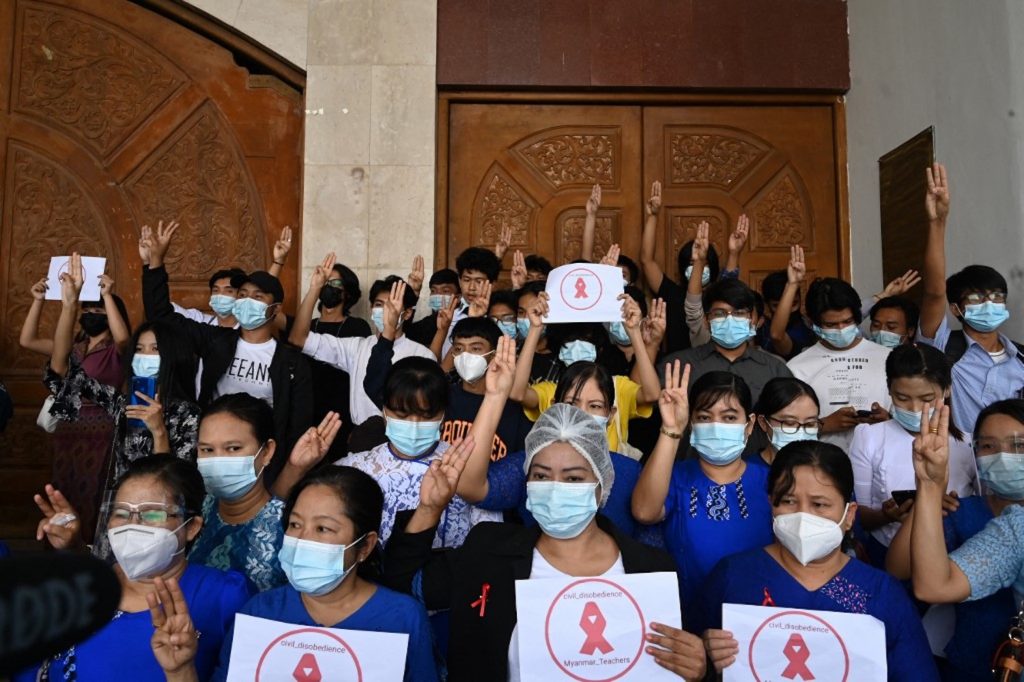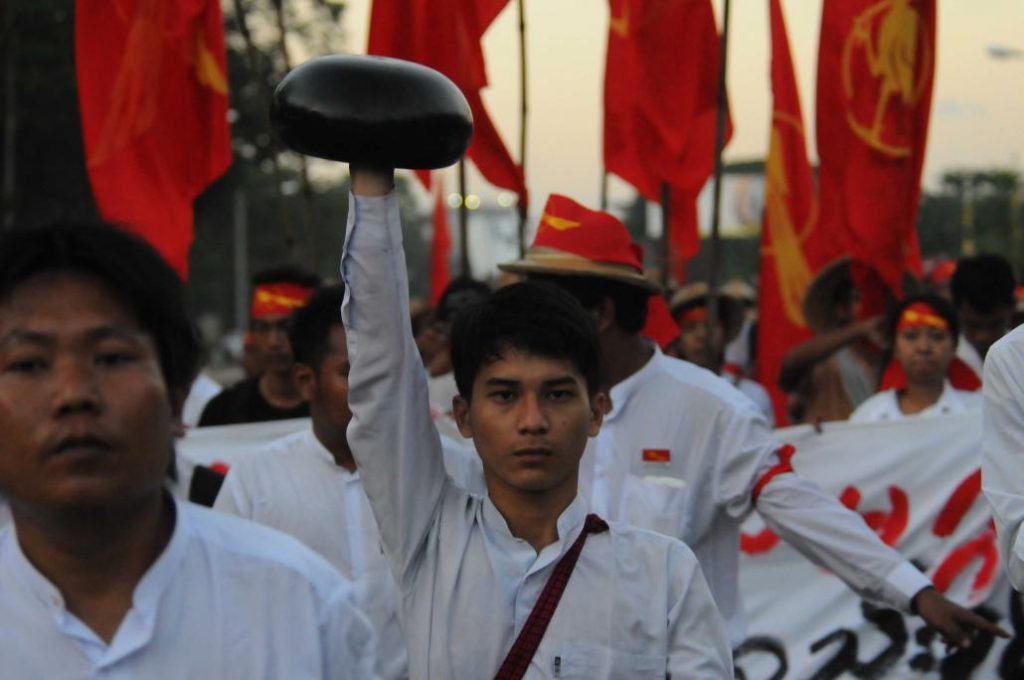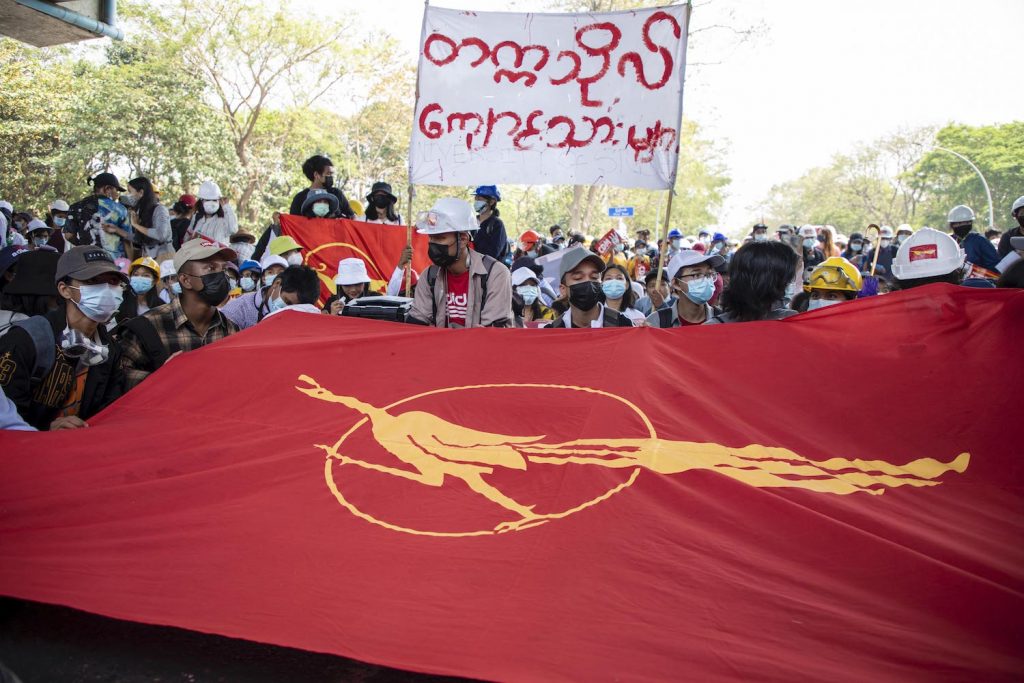Mysterious associations have been replacing independent student unions, which have long played an active role in the pro-democracy movement.
By FRONTIER
A month after Sittwe University reopened in January of this year, its authorities told the students’ union and the teachers’ union that their offices on campus would be demolished.
“The university authorities said they wanted to open a recreation centre on the site of our office and that we needed to move, and that they would not allow us to have an office on the campus,” said law student Ko Kyaw Naing Htay, 24, a member of the Sittwe University Students’ Union interim executive committee.
Student unions have long been among the most politically active groups in Myanmar, playing a prominent role in the independence movement, anti-military protests in 1962 and 1988, and more. Kyaw Naing Htay was arrested in 2020 and imprisoned for a year and a half for protesting the war in Rakhine.
It was inevitable that the unions would come under increased scrutiny and worse after the coup, especially when mass boycotts of state-run schools resulted in the closure of universities and colleges.
According to a January report by Radio Free Asia, more than 100 student union members have been arrested nationwide since the coup. The All Burma Federation of Student Unions says 30 of its members are in prison and at least three have been killed.
In Rakhine State, there were fewer anti-coup protests than elsewhere in Myanmar, and many students returned to schools when universities and colleges reopened. But even there, student unions are being targeted.
“They said that if we don’t move our office, we will have to face the commander of the Tatmadaw’s Western Command, so we moved to an office outside the campus,” Kyaw Naing Htay told Frontier in May.
On February 28, three days after the announcement, the university authorities closed the student union office. “When that happened, we suspected that the student union would be disbanded,” said Kyaw Naing Htay.
Two months later, their fears were proven correct. On April 29 the student union offered to hold a welcoming event for new students who would be starting when the university re-opened in May.
“When we telephoned the rector, Dr Khin Maung Zaw, to tell him of our plan for the welcoming party, he said we could not hold events in the name of the student union and that no ceremony can be held in the name of the student union. He said, ‘At the moment, we do not want a student union at the university,’” said Kyaw Naing Htay.
The abolition of student unions at universities and colleges throughout the country has coincided with the emergence of alternative groups known as student associations. Student union members believe the associations are supported by the State Administration Council, the junta’s governing body, as part of an intentional strategy to undermine resistance to military rule.
“We found that this happened at five universities,” said Ko Aung Kaung Hset, chair of the University of Yangon Students’ Union. “These situations are not coincidental; the military council is taking steps to disband the student unions.”
Although student unions have existed since the time of British colonial rule, they have been outlawed since military rule began in 1962. They remained illegal during the short-lived democratic transition, under both the military-backed Union Solidarity and Development Party and the National League for Democracy governments. Despite being technically illegal, they were allowed to openly operate on campuses again under the NLD.
Even so, they had a contentious relationship with the democratic government. In 2018, unions accused the NLD’s education ministry of trying to restrict political events on campuses. By 2020, the All Burma Federation of Student Unions was so disappointed with the NLD that it advocated for a boycott of the national election.

Student ‘associations’ take over
The Yangon University of Education was the first university to announce the dissolution of its student union following the coup, and its replacement by a student association.
Ko Shine Wunna Aung, secretary of the Yangon University of Education Students’ Union, said its members first became aware of the existence of the YUOE Students’ Association when a page appeared on Facebook in January. The association unilaterally declared that the student union had been disbanded.
A similar situation unfolded at Dagon University, also in Yangon.
“First, they announced the list of students admitted to the university and a few days later they announced the dissolution of the student union,” said Ko Min Han Htet, chair of the Dagon University Students’ Union.
In a statement issued on April 2, the Dagon University Students’ Association said the union could not represent the student body because it had been unable to hold elections and the term for the existing leadership had expired.
“The Dagon University Students’ Association has been formed to truly represent our students, so we announce the Dagon University Students’ Union is dissolved,” read the statement.
The statement said student union members, who had boycotted classes during the academic year after the coup, had violated university rules and had opposed a peaceful education.
The association said it would assume responsibility for student affairs and appointed a chair, deputy chair, secretary, financial officer, five executive committee members and 10 associate members.
“I do not know who formed the association. When I attended classes, we did not get any information about this association,” said Ma Than Than Htwe,* a 19-year-old second-year student at Dagon University who resumed her studies last year when the military council reopened universities.
She said in the past, members of the student body elected candidates to serve in the students’ union, but this wasn’t the case for the new association.
Frontier tried unsuccessfully to contact the Yangon University of Education Students’ Association and Dagon University Students’ Association.
Student union members believe that the associations were formed under the direction of the junta’s Ministry of Education as part of a campaign to destroy student unions.
“They were initially formed by the university authorities, possibly on the instructions of the SAC’s Ministry of Education,” said Shine Wunna Aung. “This is an attempt to tarnish the image of student unions. Association members are rubber stamps for the SAC.”
Min Han Htet also believes that the SAC and university authorities are behind the effort to replace unions with associations.
“The army raided the students’ union office in March last year. Now it has been abolished. So I think the SAC is directing the universities to do this, ” he said.
On the frontlines of the revolution
University student union leaders believe that the military council wants to abolish the student unions to weaken the anti-coup movement.
“After the coup, unions expected to be oppressed in this way,” said Aung Kaung Hset.
University student unions played a leading role in organising mass street protests against the coup, including the first major demonstration on February 6 of last year.
“The military regards student unions as the enemy. We students are also an obstacle to their hold on power and their interests,” said Aung Kaung Hset. “This is why the military wants to abolish student unions and arrest their members.”
Some of the most prominent leaders of the anti-coup movement are former student union activists, including Dr Tayzar San and Daw Ei Thinzar Maung, who is now the deputy minister for women’s affairs in the parallel National Unity Government.
“Student unions have been fighting oppression on the side of the people in Burma since the British colonial era. In the 1988 uprising, student unions led the way,” said Min Han Htet. “So, it is not surprising that student unions are deeply involved in the Spring Revolution. Politics and student unions are inseparable.”
Student union leaders said one reason for the junta’s hostility was the role they and teachers’ unions played in the mass strike known as the Civil Disobedience Movement. When the regime tried to reopen schools and universities in May 2021, the unions led an effective campaign to boycott classes that saw enrolments plummet, embarrassing the junta.
“The attendance rate at universities remains very low; it is less than 10 percent,” claimed Shine Wunna Aung. “The SAC wants university students to return to their classes. So they have tried to abolish student unions and will try to encourage students to return to classes through the student associations they have formed.”
Some student union members have also joined the armed revolution against the military.
“They are trying to disband the student unions to weaken the Spring Revolution,” said Aung Kaung Hset. “Student unions are the lifeblood of the revolution, so they want to destroy us.”

The student union spirit
The central committee members of university student unions are elected by the student body for terms of a year or longer, depending on the university.
“We can say we represent the students because we are chosen by the students,” said Min Han Htet. “Because student unions are formed by students we are independent organisations and we cannot be abolished by any authority.”
But the boycott of universities since the coup has also prevented new elections from being held.
“The university cannot reopen as normal now. So, those who go to junta-run schools during this revolution cannot dissolve unions,” said Shine Wunna Aung.
Students believe that disbanding the unions is a violation of their rights that will impact them beyond the fight for democracy.
“Students unions are also fighting for such issues as university budget transparency,” said Ma Shwe Yee*, 21, a third-year law student at Dagon University. “We should know how the university budget is spent. This is one of the rights of students and student unions have taken the lead in demanding this,” she said.
Kyaw Naing Htay, from the Sittwe University Students’ Union, said they have also been involved in fighting for educational development in Rakhine State.
“Facilities at Sittwe University are far behind those in the rest of Myanmar. We always requested the authorities to open libraries and to teach new majors,” Kyaw Naing Htay said, explaining that Rakhine students typically need to go to Yangon or Mandalay to learn certain subjects, like political science.
“Without unions, students’ rights will be lost. The university authorities are doing whatever the government instructs. There is not much support for the students,” he said.
Although she broke with the union-lead boycott by returning to school, Than Than Htwe is firm in her continued support for student unions.
“Student unions have taken care of everything,” she said, explaining that they help students with any disputes they may have with the university, including arguments over fees, problems with their dormitories, or conservative regulations like banning female students from wearing pants. Than Than Htwe does not believe that the newly formed associations will stand up for students in the same way.
“I do not know who formed them. If it was the school authorities, I doubt that there will be much opposition from the professors and other academic staff,” she said.
But while they may be banned on paper, student union leaders are adamant that no authority can abolish their organisations.
“The SAC can close our offices and it can announce the cancellation of our organisations, but as long as there are students, there will be student unions,” said Shine Wunna Aung. “No one can break the student union spirit in our heart.”







